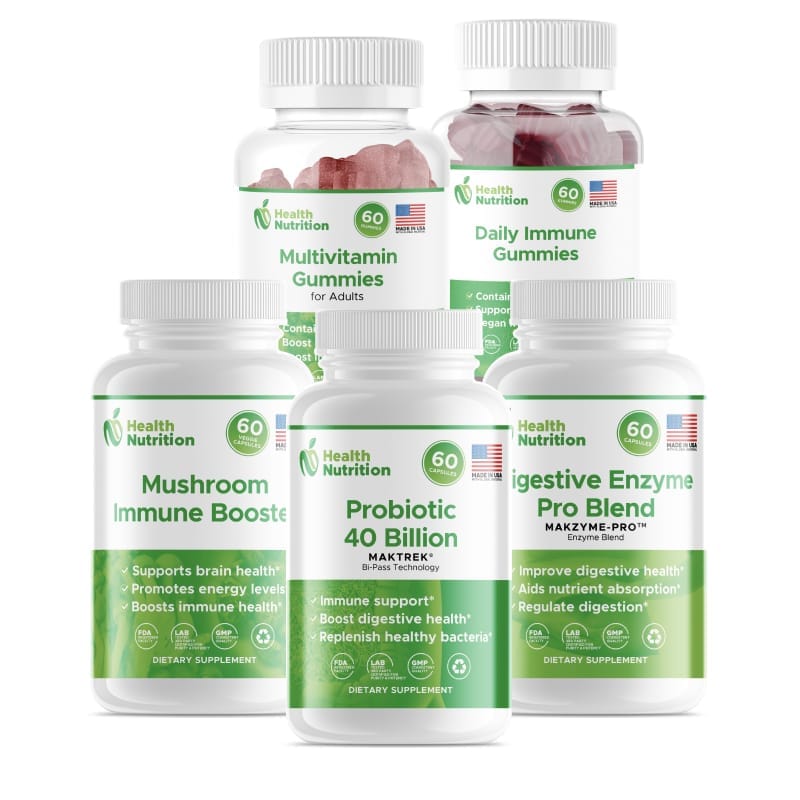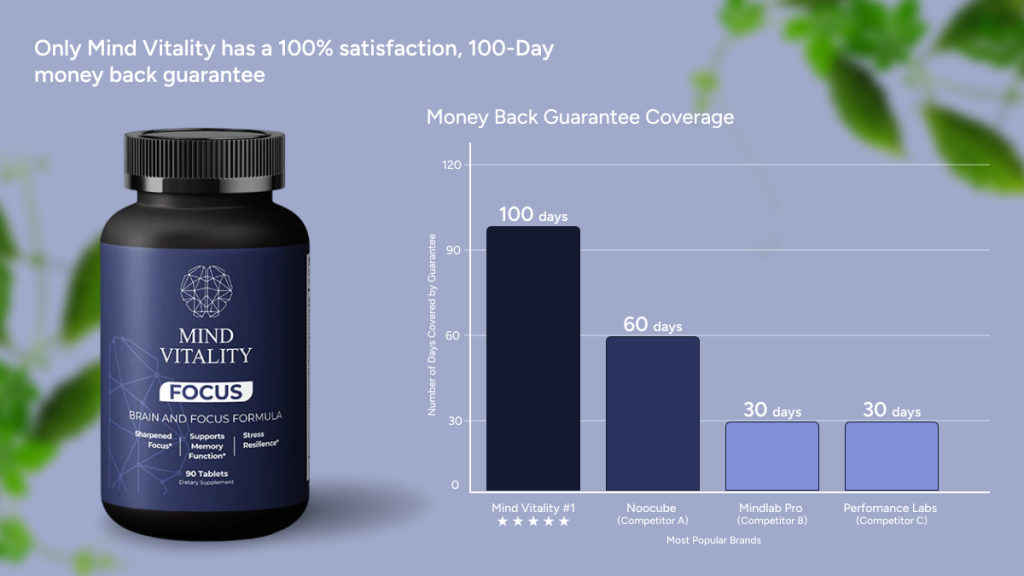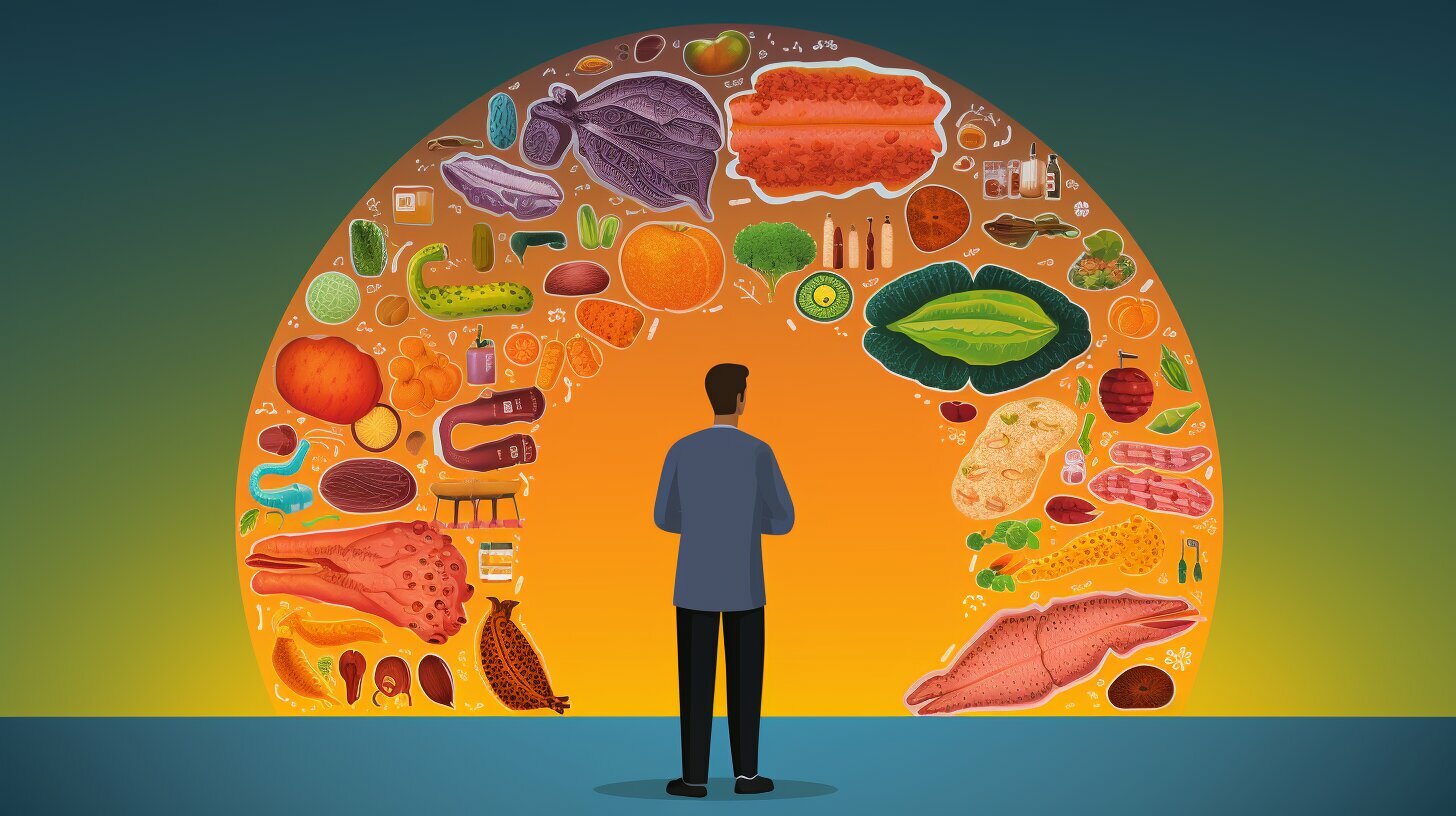Table of Contents
ToggleProbiotics have gained significant popularity in recent years for their potential health benefits, but one lingering question remains: do probiotics really increase hunger?
In this article, we delve into the debated link between probiotic consumption and hunger. Join us as we investigate the hunger myth surrounding probiotics and explore the latest research on gut health, digestion, and the gut-brain connection.
Key Takeaways:
- Probiotics have gained popularity for their health benefits
- The relationship between probiotics and hunger is a topic of debate
- Investigating the latest research on gut health, digestion, and the gut-brain connection
- Clinical trials have examined the impact of probiotics on appetite
- Understanding the role of prebiotics in appetite regulation

The Role of Probiotics in Gut Health and Digestion
The gut is home to trillions of bacteria that make up our microbiome, playing a crucial role in our overall health and digestion.
In this complex ecosystem, people often hail probiotics as superheroes that promote a healthy balance of beneficial bacteria and support optimal gut function.
Probiotics are live microorganisms, such as certain strains of bacteria or yeast, that can provide health benefits when consumed in adequate amounts.
These beneficial bacteria help maintain the balance of our gut microbiota, which is essential for efficient digestion and nutrient absorption.
Research suggests that probiotics can improve gut health and digestion by:
- Enhancing the breakdown of food particles
- Aiding in the absorption of nutrients
- Producing enzymes that assist in digestion
- Supporting the integrity of the intestinal barrier
- Regulating gut motility
Probiotics have been shown to positively influence gut health by reducing inflammation, enhancing immune function, and promoting overall digestive comfort.
These benefits make them a popular choice for individuals seeking to optimize their gut health and improve digestion.
| Probiotics | Prebiotics | |
|---|---|---|
| Definition | Live microorganisms that confer health benefits when consumed in adequate amounts | Non-digestible fibers that stimulate the growth of beneficial bacteria in the gut |
| Source | Fermented foods (e.g., yogurt, sauerkraut), dietary supplements | Plant-based foods (e.g., bananas, onions, garlic), dietary supplements |
| Benefits | Improved gut health, enhanced digestion, strengthened immune system | Supports the growth of beneficial bacteria, enhances gut health |
| Mode of Action | Colonizes the gut with beneficial bacteria, produces beneficial compounds | Provides nourishment for beneficial bacteria, stimulates their growth |
Unraveling the Hunger Myth: Investigating the Link
Countless anecdotal accounts claim that taking probiotics leads to increased hunger, but what does the scientific research say?
To separate fact from fiction, we turn to a post hoc analysis of a clinical trial conducted on patients with major depressive disorder (MDD).
This study aimed to investigate the impact of probiotic supplementation on appetite, weight, body mass index (BMI), dietary intake, serum leptin levels, and physical activity.
The trial randomly assigned 81 MDD patients to receive probiotics, prebiotics, or a placebo for 8 weeks.
The results of the study revealed intriguing findings related to appetite. The desire to eat increased over time in the probiotic group, suggesting that probiotic consumption may indeed have an effect on hunger levels.
Conversely, the group given prebiotics, which boost beneficial gut bacteria, saw no notable shifts in appetite.
The probiotic group also showed higher energy intake and leptin levels compared to the prebiotic group.
Leptin is a hormone that regulates hunger and energy expenditure, and its elevated levels indicate a potential role of probiotics in influencing appetite.
These findings provide valuable insights into the hunger myth surrounding probiotic consumption and shed light on the potential mechanisms through which probiotics may affect hunger and thirst.
| Group | Desire to Eat | Energy Intake | Leptin Levels |
|---|---|---|---|
| Probiotics | Increased over time | Significantly higher | Significantly increased |
| Prebiotics | No significant changes | No significant changes | No significant changes |
This study offers key insights, but note the findings specifically apply to patients with major depressive disorder.
Further research is needed to fully understand the generalizability of these results to the broader population.
Nevertheless, this study contributes to the growing body of evidence suggesting that probiotics may play a role in appetite regulation.

NLP and Appetite Regulation
The gut and brain are intricately connected through a complex network of nerves and chemical signals, influencing various aspects of our health, including appetite regulation.
This connection, known as the gut-brain axis, plays a crucial role in determining our hunger and satiety signals.
Neuro-linguistic programming (NLP) is a technique that utilizes language and communication to reprogram the mind and influence behavior.
In the context of appetite regulation, NLP can be used to reshape our perception of hunger and satiety, helping us establish healthier eating habits.
By harnessing the power of language and visualization, NLP techniques can potentially assist individuals in achieving better appetite control.
Studies exploring the specific effects of NLP on appetite are limited, anecdotal evidence suggests that it can be a powerful tool for retraining our relationship with food.
By reprogramming our subconscious mind and adopting new thought patterns, NLP may help individuals overcome emotional eating and develop a healthier mindset towards hunger and satiety.
It’s important to note that the impact of probiotics on appetite regulation is still a topic of ongoing research. A post hoc analysis of a clinical trial on patients with major depressive disorder (MDD) provided some insights.
The analysis revealed that probiotic supplementation for 8 weeks resulted in improved appetite in MDD patients, while prebiotic administration had no significant effect on appetite.
This finding suggests that probiotics may positively impact appetite regulation in specific populations.
| Group | Desire to Eat | Energy Intake | Leptin Levels |
|---|---|---|---|
| Probiotic Group | Increased over time | Significantly increased | Higher compared to the prebiotic group |
| Prebiotic Group | No significant change | No significant change | – |
While more research is needed to fully understand the mechanisms behind the gut-brain connection and how probiotics influence appetite, these findings provide valuable insights.
They suggest that probiotic supplementation may offer potential benefits for appetite regulation, particularly in individuals with specific health conditions such as major depressive disorder.

Clinical Trials and Appetite: What the Science Says
A recent post hoc analysis of a clinical trial on patients with major depressive disorder sheds light on the impact of probiotics on appetite.
In the study, 81 MDD patients were randomly assigned to receive probiotics, prebiotics, or a placebo for 8 weeks.
The researchers measured various factors including appetite, weight, BMI, dietary intake, serum leptin, and physical activity.
The findings revealed that probiotic supplementation had a positive effect on appetite.
Throughout the study, the desire to eat increased in the probiotic group. Energy intake and leptin levels were also significantly higher in the probiotic group compared to the prebiotic group.
This data suggests that probiotic consumption may have a beneficial impact on appetite, particularly in individuals with major depressive disorder.
It’s important to note that prebiotic administration did not show a significant effect on appetite in this particular study.
Further research is needed to fully understand the mechanisms behind these findings and to explore the potential benefits of probiotics on appetite in different populations.
| Group | Appetite | Energy Intake | Leptin Levels |
|---|---|---|---|
| Probiotic | Increased | Significantly higher | Significantly increased |
| Prebiotic | No significant effect | N/A | N/A |
| Placebo | N/A | N/A | N/A |
This study contributes to the growing body of research on the relationship between probiotics and appetite.
While the exact mechanisms are still being explored, these findings suggest that probiotic supplementation may have a positive impact on appetite regulation in certain populations.
As we continue to learn more about the gut-brain axis and the role of the microbiome in overall health, further studies will help clarify the potential benefits of probiotic consumption on appetite control and well-being.
The Role of Prebiotics
Prebiotics are non-digestible fibers that stimulate the growth and activity of beneficial gut bacteria, promoting overall gut health.
Understanding their role in appetite regulation could provide valuable insights into the hunger myth surrounding probiotics.
Recent research has shed light on the potential impact of prebiotics on appetite.
In a post hoc analysis of a clinical trial on patients with major depressive disorder (MDD), it was found that probiotic supplementation for 8 weeks improved appetite, while prebiotic administration had no significant effect on appetite.
The study, which included 81 MDD patients, examined various measures of appetite, weight, BMI, dietary intake, serum leptin levels, and physical activity.
Throughout the study, the desire to eat increased in the probiotic group, indicating a potential positive impact on appetite. Energy intake and leptin levels were also significantly increased in the probiotic group compared to the prebiotic group.

The Role of Prebiotics in Appetite Regulation
While the study suggests that probiotic supplementation may have a positive impact on appetite in MDD patients, it’s important to note that prebiotic administration did not exhibit similar effects.
This highlights the need for further research to fully understand the relationship between prebiotics and appetite regulation.
The contrasting results between probiotics and prebiotics indicate that the hunger myth may be specific to probiotic consumption.
The unique characteristics and mechanisms of action of prebiotics may contribute to different effects on appetite.
Additional studies are necessary to explore this further and determine if prebiotics offer alternative solutions for appetite regulation.
| Study Results: | |||
|---|---|---|---|
| Probiotic Group: | Improved appetite over 8 weeks | Increased energy intake | Elevated leptin levels |
| Prebiotic Group: | No significant effect on appetite | No significant changes in energy intake | No significant changes in leptin levels |
The existing evidence suggests that prebiotic administration does not have the same impact on appetite as probiotic supplementation.
By understanding the distinct effects of prebiotics, we can gain a deeper understanding of their potential benefits for gut health and digestion.
A Word From HealthyVibe
After extensively investigating the hunger myth of probiotic consumption, we can conclude that the relationship between probiotics and appetite is complex.
Potential variations depend on factors such as the individual’s health condition and the type of probiotic strain used.
The type and strain of probiotics used may play a role in their impact on appetite, and this warrants further investigation.
While there is evidence suggesting that probiotic consumption may have a positive impact on appetite, more studies are needed to provide a clearer understanding of the effects in different populations and to identify the specific mechanisms involved.
FAQ
1. Does probiotic supplementation increase appetite in patients with Major Depressive Disorder (MDD)?
The findings of a clinical trial suggest that probiotic supplementation may have a positive impact on appetite in MDD patients.
2. What were the results of the study regarding appetite and probiotic supplementation?
The study found that desire to eat increased over time in the probiotic group, and energy intake and leptin levels were significantly increased in the probiotic group compared to the prebiotic group.
3. Did prebiotic administration have any significant effect on appetite?
No, the study found that prebiotic administration had no significant effect on appetite.
4. How long did the patients receive probiotics, prebiotics, or a placebo?
The patients received probiotics, prebiotics, or a placebo for 8 weeks.
5. How many patients were included in the study?
The study included 81 patients with Major Depressive Disorder (MDD) who were randomly assigned to receive probiotics, prebiotics, or a placebo.
6. What other factors were measured in the study?
In addition to appetite, the study also measured weight, body mass index (BMI), dietary intake, serum leptin, and physical activity.
7. What is the significance of the study’s findings?
The study’s findings suggest that probiotic supplementation may be beneficial for improving appetite in patients with Major Depressive Disorder (MDD).











